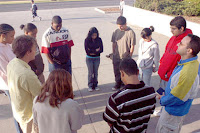Executive summary about a truthful prophet by Ali Zohery, Ph.D.
The Prophet was recognized, even by the Quraish of Mekkah, his worst enemies, who called him by the name of as-Sadiq and al-Amin long before his Prophet hood because of his honest and truthful dealings as a trader. The consistency of his honest and truthful conduct is proven by the fact that he began his mission of Prophethood with the words: La ilaha illa ‘Llah and ended his Mission with the same thought when he said, on his death bed:
“Lord! Blessed Companion on High.” Having sincerely and faithfully rendered his obligations towards Allah’s creatures, he then returned to the loving bosom of Allah and His Companionship on High (Bukhari, 4463).
He loved truth intensely, adhered to and preached truth all his life, never uttered a single lie all his life, either before or after his Prophethood.
The Prophet went further to say a true action leads to the path of virtue, and virtue paves the way of a person to paradise, and this person continues to speak the truth until, in the sight of Allah, he is named as-S’iddiq (the Truthful). Lying, on the other hand, leads to vice, and vice leads to indecent acts and a person goes on lying until, in the sight of Allah, he is called a liar (Bukhari, 116).
Four characteristics belong to a believer: when he speaks, he speaks the truth: when he is trusted, he fulfils his trust; when he makes a promise, he abides by his promise; and when he is in dispute with anyone, he does not use obscene words (but sticks to the truth). (Bukhari)
These sayings clearly show that, according to the Prophet, a truthful and righteous person is one who is truthful in words, in intentions, in motives and in actions. The Prophet was an embodiment of truth, honesty and righteousness, did not speak anything but truth all his life, did not preach anything but truth and did not practice anything but truth. Ah! It is an undeniable fact that truthfulness is an indispensable quality of a Prophet. And this quality was found in absolute perfection in the person of the Prophet, loved truth and righteousness and never spoke a lie throughout his life, replied in these words:
My object is quite different from what you have said. I have not come to you with my call for the purpose of amassing wealth, or to secure leadership of the clan or to become your king. In fact God has sent me to you as His Messenger and has revealed to me the Law and has ordered me to warn you and to give glad tidings. So I have conveyed to you the injunctions of God and have done my responsibility for your welfare. Now if you accept what I have conveyed to you it will be good for you here and hereafter. But if you reject it, I will patiently wait for the Divine dispensation when God shall decide between you and me. (Rahman, Encyclopaedia of Seerah, Vol. VIII, p. 161).
This reply of the Prophet showed his determination to fight for the truth, which he held to be dearer than life. Weary and wounded, he prayed to his Lord in these most passionate and honest words:
0 Lord! To You alone I make complaint of my helplessness, the paucity of resources and my insignificance before humankind. You are the most Merciful of the mercifuls. You are the Lord of the helpless and the weak, 0 Lord of Mine! Into whose hands would You abandon me, into the hands of an unsympathetic foe who would sullenly frown at me, or the enemy who has been given control over my affairs? But if Your Wrath does not fall upon me, there is nothing for me to worry about. . . I seek protection in the light of Your Countenance, which illuminates the heavens and dispels every darkness, and which controls all affairs in this world as well as in the hereafter. May it never be that I should incur Your Wrath, or that You should be wrathful to me. And there is no power nor resource, but Yours alone. ( Rahman, 1992, 161-162)
There is no doubt that this prayer confirms his extreme love for the truth and belief in the Majesty and Grandeur of Allah, also affords an insight into the working of the Prophet’s mind and reflects the loftiness of his thinking, the purity of his spirit and the nobility of his feelings. Prophet Muhammad defined a truthful and righteous man in these words: “He who is truthful in words, in motives, in intentions, in determination, in obedience, in actions and in religious duties” (Rahman, Encyclopaedia of Seerah, Vol. VIII, p. 162).











